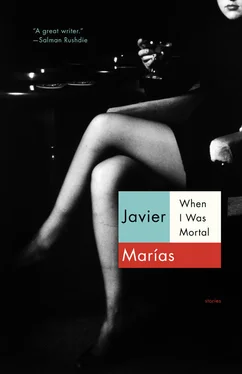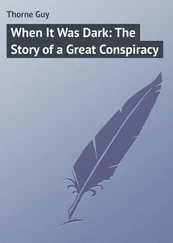I can’t honestly say that he did, in that he didn’t keep me informed of his progress or of his thoughts on the subject, perhaps because he could only talk about it indirectly, by describing feelings and symptoms and states of mind, which he didn’t in the least mind discussing and so, in the letters I received in subsequent months — I was commuting between Madrid and Italy at the time — he never said much about what was happening to him or what he was thinking, his letters were even more laconic than usual, but he did sometimes let slip the occasional disquieting remark — explicit or enigmatic, confessional or cryptic, depending on the context. I’ve just today been re-reading some remarks of his that fall into the second category, remarks that usually came at the end of his letters, just before he signed off or even after that, in a postscript: “Pain thought pleasure and future are the four numbers necessary for and sufficient to my interest.” “Nothing sullies one more than an excess of modesty: pay up rather than be your own Shylock.” “Let’s just do our best not to fall off the back of the train.” “If you don’t desert the desert, the desert will desert you, not in the sense that it will leave you, but in the sense that it will make a desert of you.” “Best wishes and don’t let anyone have it easy. They might make you pay for it.” That’s the sort of thing he wrote. There was more of a sense of continuity, even a kind of progress, in the first category of remarks: “I don’t feel like writing, I don’t feel like working or travelling or thinking or even despairing,” he said and then, in the next letter: “I read so as to give some semblance of being occupied.” Some time afterwards, I thought that perhaps he’d recovered slightly, for he spoke openly — for the first time — of the experiment on which he was engaged: “As for my ethical experiment in endogenous pain, I’m still waiting for the explosion of the time bomb I set ticking at the beginning of summer, but I don’t know the day or the hour it’s due to go off. You see how things are, but don’t waste too much time thinking about it, it’s too pathetic to merit any deep consideration, and if there can be said to be something titanic about all this, the truth is that I feel more like a midget.” I don’t know what I wrote in reply nor if I even asked him about it, for we forget what’s in our own letters the moment we put them in the letter box, or even before that, while we’re still licking the envelope and sealing it down. He continued to give me only the bare outlines of his inactivity: “A bit of medicine, very little wielding of the pen, rather more withdrawal. Dead wet leaves.” I remembered that, on his first and failed attempt, he’d mentioned a period of six months as the time he would need to go without his medication in order to achieve what he was after, and so, with the arrival of winter, I expected that his time bomb would either explode or he’d have to stop the experiment, even if that meant being rushed into hospital again. But that season only contributed to a worsening of his suffering, which he nevertheless still judged to be insufficient: “For two months now I’ve been more dead than alive. I don’t write, don’t read, don’t listen, don’t see. I hear the distant rumble of thunder but I don’t know if the storm is approaching or moving off, whether it’s in the future or in the past. I’ll close now: the vulture is already pecking at my left hemisphere.” I assumed he was referring to the migraine tormenting him.
Another two months passed by with hardly any news and, at the end of that time, I received a phone call in Madrid from Eliane. After their separation I’d lost all contact with her but I still couldn’t manage to feel surprised, instead I immediately thought the worst. “Xavier asked me to call you,” she said, and since there was no indication as to when that had happened, I wasn’t sure whether he’d asked her to do so before he died or if he’d asked her that very moment, assuming he was still alive. “He suffered a serious relapse and he’s in hospital, possibly for some time, but he can’t write to you for the moment and he didn’t want you to worry too much. He’s been very ill, but he’s better now.” Her words were as acceptably conventional as one would expect in such a phone call, but I did manage to ask her two things, even though that meant obliging a memory, that is, someone who was a memory twice over, to speak: “Did he try to kill himself?” “No,” she replied, “it wasn’t that, but he has been very ill.” “Are you going to go back to him?” “No,” she replied, “that’s not possible.”
During the final two years of our friendship, Xavier and I wrote and saw each other less frequently, I only went to Paris once and he never again visited Madrid. He often either neglected to answer my letters or took a long time to reply, and everything requires a certain rhythm. There are other things I could say about him, but I don’t want to talk about them now, they’re not things I actually experienced. The last time we saw each other was on a very brief trip I made to Paris. We had lunch at Balzar; he’d got a bit fatter — his chest had filled out — and it rather suited him. He smiled a lot like someone for whom going out to lunch is something of an event. He told me cautiously and briefly that, during our silence, he’d finally written his essay on pain. He said he felt sure it would be published, but said nothing about the text itself. Now he was working, continuously but with enormous difficulty, on his last book, Saturn . It all felt rather remote: for me, his life had become even more fragmentary, more spectral, as if, on the final pages of the defective book, there was now only punctuation, or as if I’d begun to feel that he too were merely a memory or some fictitious character. Although he was almost bald by then, his face was still handsome. I remember thinking that the veins on his forehead, even more prominent now, stood out like high relief. We said goodbye there, in rue des Écoles.
After that, I received only one letter and a telegram. The former I received after some months had passed and in it he said: “I’m not writing because I’ve finally got something to say to you, but simply because time passes and every day leaves me with less to say. Nothing positive. A horrible winter, full of recesses filled by swirling whirlwinds. Sediment and chaos. A dematerializing silence from my publishers. Divorce from Eliane. And a feeling of nausea as regards any creative work. Last week was filled by a coagulating tedium. The night before last was even worse: I was woken by a scream, my own.” And the postscript said: “So I will darken for only a little while longer this my ash-grey matter.”
I didn’t feel particularly worried by this and I didn’t bother to reply because in two weeks’ time I would be going to Paris anyway. That was a little over two years ago. I’d already been in the city for three days, staying as usual with my Italian friend, and I still hadn’t phoned Xavier, wanting to get my business in Paris over with first. On the third day I returned to the house of that Italian friend, the one who had been cruel to him or who had acted in self-defence, and she told me of his voluntary death the day before yesterday. This time he wasn’t too young, this time he didn’t miss; he was a doctor, he was precise; and he avoided all pain. Some days later, I managed to phone his mother, whom I never met. She told me that Xavier had completed Saturn two nights before the day he died (his one hundred per cent: he had reached the end of his life when he reached the end of the page). He’d made two copies and had written three letters, which were found on the table next to a glass of wine: a letter to her, a letter to his unsuccessful agent and a letter to Eliane. In the letter to his mother he’d explained the whole ritual: he would read for a while, listen to a bit of music and drink some wine before going to bed. Over the phone she was unable to tell me what music he’d listened to or what he’d read, and I never asked her again, so as not to have to remember that as well. Of the more than one thousand pages of Burton’s Anatomy of Melancholy , he’d translated only seven hundred — seventy-two per cent — and the rest still awaits someone to finish the task. I don’t know what happened to his essay on pain.
Читать дальше












